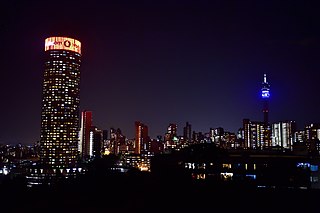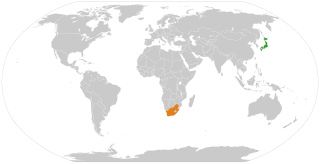
Soweto is a township of the City of Johannesburg Metropolitan Municipality in Gauteng, South Africa, bordering the city's mining belt in the south. Its name is an English syllabic abbreviation for South Western Townships. Formerly a separate municipality, it is now incorporated in the City of Johannesburg Metropolitan Municipality, and one of the suburbs of Johannesburg.

Johannesburg is the most populous city in South Africa with 4,803,262 people, and is classified as a megacity; it is one of the 100 largest urban areas in the world. It is the provincial capital and largest city of Gauteng, which is the wealthiest province in South Africa. Johannesburg is the seat of the Constitutional Court, the highest court in South Africa. Most of the major South African companies and banks have their head offices in Johannesburg. The city is located within the mineral-rich Witwatersrand hills, the epicentre of the international-scale mineral, gold and (specifically) diamond trade.

The Market Theatre, based in the downtown bohemian suburb of Newtown in Johannesburg, South Africa, was opened in 1976, operating as an independent, anti-racist theatre during the country's apartheid regime. It was named after a fruit and vegetable market that was previously located there. It was also known as the Old Indian Market or the Newtown Market, which closed after 60 years. The Market Theatre was renamed John Kani Theatre in 2014 after the renowned South African stage actor John Kani.
The British diaspora in Africa is a population group broadly defined as English-speaking people of mainly British descent who live in or were born in Sub-Saharan Africa. The majority live in South Africa and other Southern African countries in which English is a primary language, including Zimbabwe, Namibia, Kenya, Botswana, Zambia. Their first language is usually English.
The following lists events that happened during 1961 in South Africa.
The following lists events that happened during 1980 in South Africa.
The following lists events that happened during 1955 in South Africa.
The following lists events that happened during 1992 in South Africa.
The following lists events that happened during 1963 in South Africa.

The City of Johannesburg Metropolitan Municipality is a metropolitan municipality that manages the local governance of Johannesburg, the largest city in South Africa. It is divided into several branches and departments in order to expedite services for the city. Zulu is the most spoken home language at 23.4% followed by English at 20.1%.
White South Africans generally refers to South Africans of European descent. In linguistic, cultural, and historical terms, they are generally divided into the Afrikaans-speaking descendants of the Dutch East India Company's original settlers, known as Afrikaners, and the Anglophone descendants of predominantly British colonists of South Africa. In 2016, 57.9% were native Afrikaans speakers, 40.2% were native English speakers, and 1.9% spoke another language as their mother tongue, such as Portuguese, Greek, or German. White South Africans are by far the largest population of White Africans. White was a legally defined racial classification during apartheid.

Indian South Africans are South Africans who descend from indentured labourers and free migrants who arrived from British India during the late 1800s and early 1900s. The majority live in and around the city of Durban, making it one of the largest ethnically Indian-populated cities outside of India.
Portuguese South Africans are South Africans of Portuguese ancestry. The exact figure of how many people in South Africa are Portuguese or of Portuguese descent are not accurately known as many people who arrived during the pre-1994 era quickly assimilated into English and Afrikaner speaking South African communities. There was likely also an undercount of immigrants, especially from Madeira.

The United States and South Africa currently maintain bilateral relations with one another. The United States and South Africa have been economically linked to one another since the late 18th century which has continued into the 21st century. United States and South Africa relations faced periods of strain throughout the 20th century due to the segregationist, white minority rule in South Africa, from 1948 to 1994. Following the end of apartheid in South Africa, the United States and South Africa have developed a strategically, politically, and economically beneficial relationship with one another and currently enjoy "cordial relations" despite "occasional strains". South Africa remains the United States' largest trading partner in Africa as of 2019.

South African Australians are citizens or residents of Australia who are of South African descent.

Liliesleaf Farm, also spelt Lilliesleaf and also known simply as Liliesleaf, is a location in northern Johannesburg, South Africa, which is most noted for its use as a safe house for African National Congress (ANC) activists during the apartheid years in the 1960s. In 1963, the South African police raided the farm, arresting more than a dozen ANC leaders and activists, who were then tried and prosecuted during the Rivonia Trial.

Japan–South Africa relations are the current and historical bilateral relations between Japan and South Africa.
Italian South Africans are South African-born citizens who are fully or partially of Italian descent, whose ancestors were Italians who emigrated to South Africa during the Italian diaspora, or Italian-born people in South Africa. They are primarily descended from Italians who emigrated to South Africa during the late 19th century and early 20th century.
Lebanese people in South Africa have a population exceeding 5,100 and other estimates report a total of 20,000 Lebanese in South Africa. In addition, an increasing number of Lebanese students seeking education and career opportunities opted for the country in light of its relatively reputable institutions across the Middle East. Most of the Lebanese people in South Africa live mainly in the cities of Johannesburg and Cape Town.











